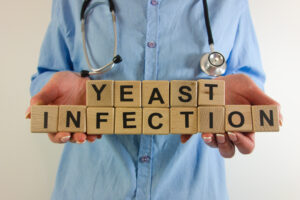
Let’s talk about yeast infections
Yeast infections … not anyone’s favorite subject, but, unfortunately, most women will get at least one vaginal yeast infection during their lifetimes. If you haven’t had one yet, chances are you will, so let’s talk about it. It’s important to understand why you get them and what to do when you suffer from unpleasant symptoms, such as itching and discharge.
Vulvovaginal candidiasis is the medical name for this condition
When our San Antonio OBGYNs talk to you about your infection, they will probably call it a yeast infection, but the medical name for the condition is vulvovaginal candidiasis. Candidiasis is a type of yeast that usually causes a yeast infection. It’s normal to have yeast in the vagina, but when the chemical balance in the vagina gets out of whack, too much yeast grows in the vagina, causing an infection.
Which factors increase your risk of developing an infection?
Several factors can cause your vaginal environment to change and get out of balance, putting you at an increased risk of developing a yeast infection.
- Pregnancy
- Diabetes, especially when blood sugar levels are not well-controlled
- Using vaginal sprays or douches
- Using hormonal birth control with higher levels of estrogen
- Weakened immune system caused by various conditions
- Recent use of antibiotics or steroid medication
What symptoms do yeast infections cause?
A woman with a yeast infection is not a happy camper, and if you have any of the following symptoms, you may have one.
- Itching
- Thick, white vaginal discharge that reminds you of cottage cheese, but does not have a foul smell
- Vaginal or vulvar redness, burning and swelling
- Pain during sex
- Pain during urination
How do you get rid of a yeast infection?
There are over-the-counter medicated creams and suppositories available that contain antifungal medication. The key to successfully treating yeast infections yourself is strictly following the enclosed directions. Another option is a prescription medication you can get from our San Antonio OBGYNs. You can also get cream, available over the counter or from our physicians, to help soothe the itching and irritation.
If your symptoms last more than one week, you need to call our physicians for an appointment to find out if there are other problems or why your vulvovaginal candidiasis isn’t responding to medication.
Our San Antonio OBGYNs diagnose and treat candidiasis
Our caring physicians can help you with your most embarrassing, irritating health issues. We understand that sometimes it’s no fun to be a woman, but we are here to offer you the compassion, confidentiality and help you need. Contact us for an appointment.
